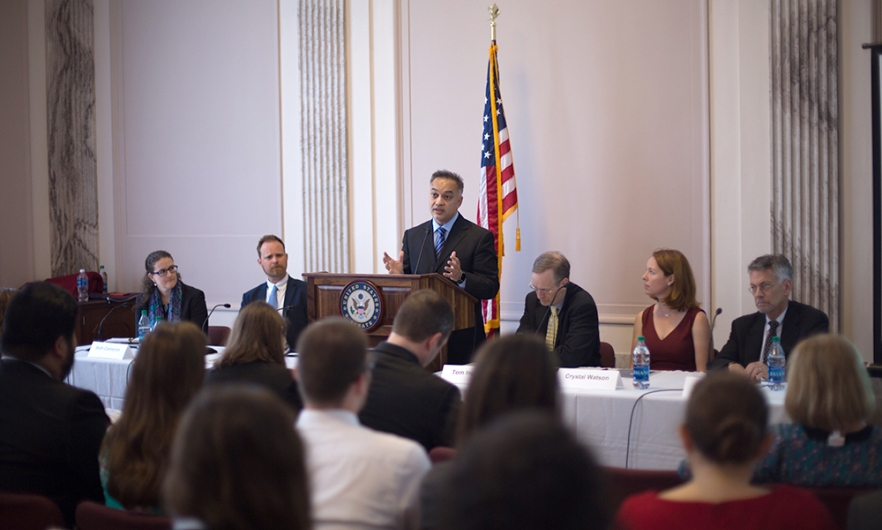Johns Hopkins Center for Health Security, Trust For America’s Health host Capitol Hill seminar on priorities for US-funded health security programs
Center News

July 05, 2017 – Even the most serious health security threats—natural or manmade, intentional or accidental—facing the United States and the world will remain far from intractable with continued federal investment in the people and programs on the front lines of preparedness.
That was the encouraging focus of a June 29 Capitol Hill seminar the Johns Hopkins Center for Health Security hosted with Trust For America’s Health (TFAH) on priorities for US-funded health security programs. The standing room-only event at the Russell Senate Office Building attracted nearly 100 Congressional staffers and other stakeholders from inside and outside government.
“Congress has a vital role to play in preparing the nation for emergencies of all kinds,” Tom Inglesby, MD, director of the Center, said in opening remarks.
It was a message affirmed repeatedly over the next 90 minutes by a panel of nationally recognized thought leaders in public health preparedness and health security policy.
“Public health is ultimately public safety,” said Umair Shah, MD, MPH, executive director of the Harris County (TX) Public Health Department. “Your constituents will be affected by public health events throughout the global community.”
Shah was joined on the panel by Crystal Watson, DrPH, MPH, senior associate at the Center, Beth Cameron, PhD, senior director for global biological policy at the Nuclear Threat Initiative (NTI), and Paul Petersen, PharmD, director of the emergency preparedness program at the State of Tennessee Department of Health.
Watson presented an overview of changes to health security program funding proposed in the President’s FY2018 budget request. The Center performs this analysis annually and produces a corresponding report. This year, Watson and co-authors Tara Kirk Sell, PhD, MA, senior associate, and Matthew Watson, senior analyst, found the proposed budget would cut federal funding for health security programs by an estimated $1.25 billion, or 9 percent, the largest decrease in more than a decade.
Strategic US investment in these programs is crucial because “preparedness costs a lot less than response,” Cameron said, in terms of lives lost and resources brought to bear.
John Auerbach, MBA, president and CEO of TFAH, also gave remarks. TFAH is a non-profit, non-partisan organization dedicated to saving lives by protecting the health of every community and working to make disease prevention a national priority.
Read NTI’s write up on the event here. View a gallery of photographs from the event.
About the Johns Hopkins Center for Health Security:
The Johns Hopkins Center for Health Security works to protect people from epidemics and disasters and build resilient communities through innovative scholarship, engagement, and research that strengthens the organizations, systems, policies, and programs essential to preventing and responding to public health crises. The Center is part of the Johns Hopkins Bloomberg School of Public Health and is located in Baltimore, MD.
